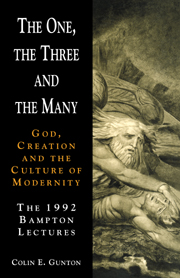Book contents
- Frontmatter
- Contents
- Preface
- Introduction
- PART ONE THE DISPLACEMENT OF GOD
- 1 From Heraclitus to Havel. The problem of the one and the many in modern life and thought
- 2 The disappearing other. The problem of the particular in modern life and thought
- 3 A plea for the present. The problem of relatedness in modern life and thought
- 4 The rootless will. The problem of meaning and truth in modern life and thought
- PART TWO RETHINKING CREATEDNESS
- Bibliography
- Index
1 - From Heraclitus to Havel. The problem of the one and the many in modern life and thought
Published online by Cambridge University Press: 05 June 2012
- Frontmatter
- Contents
- Preface
- Introduction
- PART ONE THE DISPLACEMENT OF GOD
- 1 From Heraclitus to Havel. The problem of the one and the many in modern life and thought
- 2 The disappearing other. The problem of the particular in modern life and thought
- 3 A plea for the present. The problem of relatedness in modern life and thought
- 4 The rootless will. The problem of meaning and truth in modern life and thought
- PART TWO RETHINKING CREATEDNESS
- Bibliography
- Index
Summary
THE IDEA OF MODERNITY
There are those who speak almost as though human nature has changed in the modern era, so that some quite new kind of human being has emerged. That is quite wrong. Despite what is sometimes asserted, there is a common human nature, at least in the sense that certain patterns of human social behaviour are virtually invariant, recurring wherever there is human life. We can read letters between members of families from all kinds of times and places, and know what they are about because we ourselves have the same kind of worries and concerns. The same is true of the patterns of thought and culture which form the context of our social being. Some Greek plays speak more truly to our condition than do some modern ones, while Juvenal's satires on the mores of ancient Rome could easily be adapted to speak directly of modern ways. And yet, all eras are also different. Like the unhappy families of Tolstoy's famous saying, all cultures also express in quite different ways the being of the fallen human creatures who make them up. And that brings me to the question which will be at the centre of this book, the distinctive character of the modern world, or modernity as it is sometimes called.
- Type
- Chapter
- Information
- The One, the Three and the Many , pp. 11 - 40Publisher: Cambridge University PressPrint publication year: 1993



